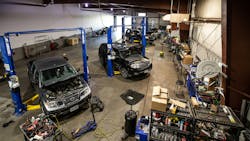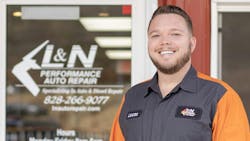Quick Lubes, Repair Shops Enjoy Reciprocal Rewards
Forming a bond, trusting one another, and referring business back and forth can pay off for quick maintenance and auto repair shops alike. And for customers, the arrangement can be a lifesaver.
How does a quick lube owner put an unofficial but long-lasting business partnership like this into play?
Two repair shop leaders—Matthew Wagg, owner of Accelerated Diagnostic & Automotive in Bennington, Nebraska, and Lucas Underwood, president of L&N Performance Auto Repair in Blowing Rock, North Carolina—share how their shops’ partnerships with quick lubes work, and why they wouldn’t trade them in.
Making a Bumpy Road Smoother
Underwood did not set out to be a businessman. He was an ace technician trained in diagnostics. So, in less than five years after starting L&N Performance in 2007, he decided the business was too stressful.
“My wife handed me an ASTE (Auto Service and Tire Alliance Event) flier that came in the mail. And so I walked through the doors, just looking to be the best tech I could be, and a guy came up to me. He wanted to know why I was taking all tech classes there when I was a business owner.”
Underwood’s new ASTE ally put him into two business management courses that day. And quickly, the L&P owner realized, “I didn’t know how to run a business—working on a car and running a business are two very different things.”
He also learned another valuable lesson: the value of connections and partnerships in a business owner’s journey.
Today, Underwood swaps business with quick lube owners in his area, and he finds these arrangements invaluable.
He explains, “If something goes wrong [during quick lube service], we handle these situations with kid gloves. I learned at the management classes not to throw anybody under the bus.”
Underwood adds, ”We’re going to take care of the problem, but we give [quick lube] shops a chance to do something first. The guys in that shop know we do high-end diagnostics and complex repairs, and they’ll tell the customer to go to us.”
For quick lubes, relationships with shops like Underwood’s can be a lifesaver.
“We know that things happen, especially with quick lubes where [technicians] are pushing boundaries and going quickly, and sometimes there’s not the level of skilled techs on staff,” Underwood says. “So we help them handle problems quickly and efficiently. If the quick lube calls and says, ‘Lucas, I have a problem with this,’ I drop things and help them.”
Wagg at Accelerated Diagnostic and Automotive, who started his shop from scratch in 2020, says his business is a competitor with local dealer service departments, but an ally with the quick lubes.
“We have a lot of referral partners,” he says. “Our team has a great deal of training and can handle things like complex electrical issues and diagnostic problems.”
Since his shop is on the outskirts of Omaha’s large metro area, Wagg uses a professional networking group to find and connect with other owners. Here, he met a gentleman who owns a local oil change shop, and through that connection his shop gets referrals.
As in Underwood’s situation, the partnership isn’t official—just beneficial on both ends.
“We have a gentlemen’s handshake,” as Wagg describes it. And even though the oil change owner sends more business Wagg’s way than vice versa, since the repair shop handles repairs the quick lube cannot, Wagg does reciprocate.
“I talk them up when I’m out and about,” Wagg notes. “It can be a slippery slope because we’re somewhat competitors, but we’d never try to take their customers or solicit that.”
The fact that Wagg’s repair shop and his unofficial partner’s quick lube are 15 miles apart helps make the relationship work even better.
Keeping a Partnership Running Right
Both Wagg and Underwood have tips for quick maintenance owners who want to cultivate relationships like the ones they describe.
“If somebody is looking to do this, they must be constantly nurturing the relationship,” Wagg states. “Stop in and talk with them, this reminds them [about you] and keeps things fresh. Give them business cards or fliers [for] their guests. Then, we both can say to our customers, ‘These guys will take great care of you if you’re in that area.’”
In his own unofficial partnership with the quick lube owner, Wagg says they’ve developed a genuine camaraderie over time.
“We visit each other’s shops, share stories, and ask for advice. This guy has a unique perspective, he’s a resource if I have business questions. And he brings his personal vehicles to us,” Wagg adds.
Underwood notes that sometimes issues with customers’ cars—the very things that brought about his unofficial partnership in the first place—can be stressful on both the quick lube and repair shop ends, especially when a client is very upset. So, he says communication is critical to keeping the business relationship working well.
“We ask questions and try to understand first before we make a move with [their] client’s vehicle,” Underwood says. And he reiterates, “I’m asking questions, not throwing them under the bus [if something went wrong at the quick lube]. It shows to their customer that they take care of things. And [together] we get clients back on the road as soon as possible.”
About the Author

Carol Badaracco Padgett
Carol Badaracco Padgett is an Atlanta-based writer and NOLN freelance contributor who covers the automotive industry, film and television, architectural design, and other topics for media outlets nationwide. A FOLIO: Eddie Award-winning editor, writer, and copywriter, she is a graduate of the University of Missouri School of Journalism and holds a Master of Arts in communication from Mizzou’s College of Arts & Science.



